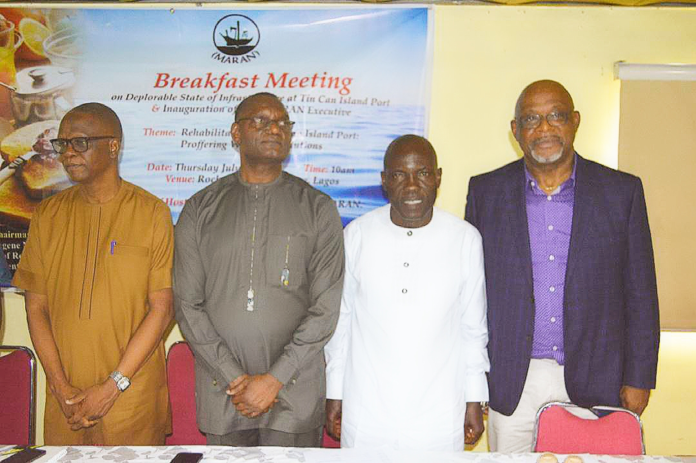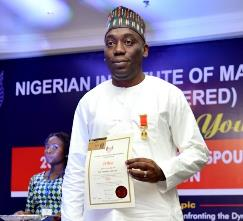
Stakeholders in the maritime sector of the economy have pointed out the numerous ills plaguing it, especially the poor state of things in the nation’s seaports even as they proffered what they called “workable solutions” to address them.
The stakeholders spoke at a breakfast meeting with the theme “Rehabilitation of Tin Can Island Port: Proffering Workable Solutions” organized by the premier umbrella body for journalists covering the maritime sector of the economy, the Maritime Reporters Association of Nigeria (MARAN).
The event which took place at Rockview Hotel, GRA, Apapa, Lagos recently attracted participants from far and near including the Executive Secretary, Nigeria Shippers Council (NSC), Hon. Emmanuel Jime and the former National President, National Association of Government Approved Freight Forwarders (NAGAFF), Chief Eugene Nweke.
Others who also pointed out the ills plaguing the maritime industry were the former Chairman of Indigenous Shipowners Association of Nigeria (ISAN), Chief Isaac Jolapamo; President-General, Maritime Workers Union of Nigeria (MWUN) and Deputy National President, Nigeria Labour Congress (NLC), Comrade Adewale Adeyanju; and the former Director General, Nigerian Maritime Administration and Safety Agency (NIMASA), Barrister Temisan Omatseye.
After taking turns to speak on the ills, they also proffered some measures to address them.
These include the decentralization of Tin Can Island Port (TCIP), Apapa, Lagos as well as other seaports in the commercial nerve centre besides the ones located in other parts of the country.
They argued that these measures would go a long way to address the infrastructure deficit, insecurity and other challenges facing the nation’s seaports.
The stakeholders were unanimous in their submission that deliberate quality concrete steps need to be done to ensure that Nigeria nay Nigerians maximize the huge potentials in the maritime industry in the years ahead.
Omatseye specifically called for the development of riverine ports to relieve the enormous pressure on the nation’s seaports situated in Lagos.
He emphasized the need for the government to recognize and appreciate the value of riverine transportation in the country just as he pointed out that when riverine transportation is effectively utilized, it will not only create employment opportunities but also give a sense of belonging to various regions across the nation.
The former NIMASA helmsman suggested that terminal operators should only be allowed to operate in Lagos if they have a waterfront location, promoting the relocation of operations to areas like Epe and Ikorodu.
He also called for the establishment of a terminal in Ijebu Waterside with the assistance of the Ondo State government as well the construction of a dual carriage road to Ore.
According to him, these strategic developments would encourage cargo movement away from Lagos, ultimately easing the strain on the port and boosting the economy of other regions. The Nigerian Ports Authority (NPA) should initiate joint ventures with barge operators and invest in first-class equipment.
He emphasized the importance of smaller feeder vessels with a draft capacity of 5.9 meters to transport cargo to ports in Warri, Koko, Onitsha, Calabar and other parts of the country.
Omatseye argued that the cost of moving cargo via water transportation to these ports would be significantly lower than traditional trucking methods, offering what he called “viable and efficient” alternatives.
Nweke who was also the Chairman of the occasion noted the need for urgent attention to be given to critical infrastructure at seaports and suggested declaring a state of emergency.
He emphasized that ports play a vital role in the nation’s economy and trade facilitation, and inefficiencies in the port system result in costly delays for ship owners.
The NPA Managing Director Mr. Mohammed Koko who was represented by General Manager, Managing Director Office, Mr. Ayo Durowaye acknowledged the significance of TCIP which account for over 60 percent of the nation’s cargo traffic annually.
While admitting the current state of TCIP and the need for repairs, he enumerated the recent accomplishments such as accommodating the largest RORO vessel at the port.
The highpoint of the occasion was the formal inauguration of the newly elected executives of MARAN which has Mr. Godfrey Bivbere as its President.
In his welcome address, Bivbere gave reasons why the association organsied the breakfast meeting.
His words: “As the foremost maritime beat group, MARAN as a stakeholder in the industry is not only concerned about some of our collapsing quay aprons. Like our landlord, the Nigerian Ports Authority and other critical stakeholders, we know the effect of these failed infrastructure on the industry overall dynamics, especially port operations.
“By and large, the entire port community is affected one way or the other, beginning with the terminal operators who have to worry about production gap to the authority, that will most likely not be able to collect it’s projected dues, same for the Nigeria Customs Service, that can only collect customs duties and associated taxes on imported goods only on the reduced number of cargo ships that berth, with a cumulative negatives on projections as well indeed on the capacity of the Federal Government to perform optimally across board”.
He expressed hope that the workable solutions at the end of this breakfast meeting would lead to the sustainable development of the maritime sector of the economy.










